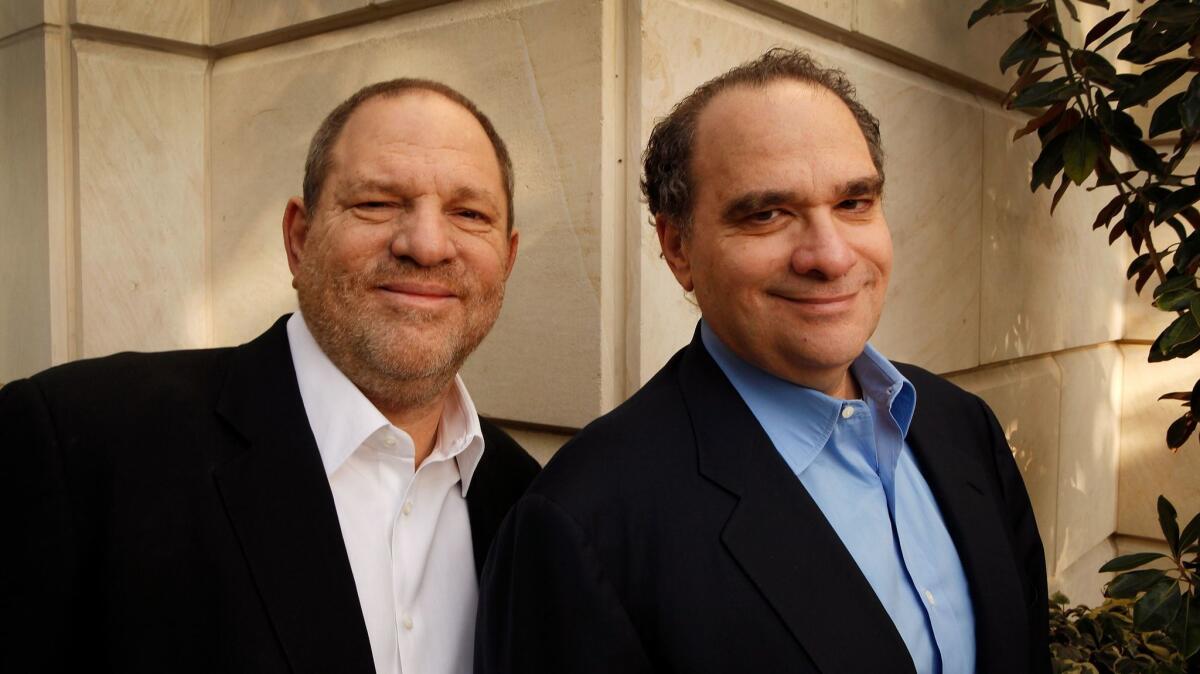Harvey Weinstein: His cinematic gifts and his bullying sway over a Hollywood he fascinated and repelled
He arrived that autumn night like a tribal leader in a strange, opulent outpost.
The crowd, many of them famous, whispered, nodded. Jane Fonda swept past the bar, Idris Elba mingled near Taylor Swift, and Cuba Gooding Jr. talked hockey in the corner. But waiters stiffened their glides and the air was suddenly charged when Harvey Weinstein, his reputation roaming a few paces ahead of him, strolled in gruff and brash, like a man who even among the elite was granted the deference of someone who could change your fortunes with a wink and a smile â or do great harm.
It was the start of awards season â Weinsteinâs make-or-break time of year â and people flocked toward him in that West Hollywood restaurant in 2013. Big-bellied, open shirt collar, blazer, looking like he may have just landed on a red-eye from New York, the impresario shook hands and studied faces as cameras flashed and a stream of Escalades rolled up outside.
Harvey Weinstein, the kid from Queens with the diamond-cutter father and the determined mother, was holding court. The sexual harassment and assault accusations that have brought him down were then still innuendo in a town that ran on complicity and silence. He sauntered through the crowd, making small talk, a man of tantrums and voracious appetites who gave us âShakespeare in Love,â âPulp Fictionâ and âsex, lies, and videotape.â
That was vintage Weinstein, a presence too big for the shadows, a force seldom obscured. Among many of those who have dealt with him since the early Miramax days, thereâs a realization that what is unfolding now is part of an untameable personality that for decades operated in the open with few restrictions.
He didnât change, Hollywood did. He was always hiding in plain sight, whether negotiating a contract, belittling one of his staff or dressing-down a director. He loved the drama, the girding for a fight that fed a passion to transform the film business and a raw desire to be a studio mogul out of Hollywoodâs Golden Age.
âHeâs a two-headed monster,â said Peter Biskind, whose book âDown and Dirty Picturesâ focused on Miramax and the rise of independent film. âPeople have to acknowledge that he put independent film on the map. There would be no independent film movement in America the way there is today if it were not for Harvey.
âBut he did a lot of damage too. ⌠The same way that he had an eye of what would sell on the movie screen, he had an eye for peopleâs weaknesses. He would push their buttons. To work there you had to have a very thick skin and the ability to absorb abuse.â
What can I say? When youâre Billy the Kid and people around you start dying of natural causes, everyone thinks you shot them.
— Harvey Weinstein
That night in 2013 epitomized the Weinstein brand: a pugilist wandering amid Champagne and glitter, a man who loved film and changed the face of independent cinema, a brilliant if ruthless marketer, a major political donor, and a producer who was charming when he needed to be and brutal by instinct. Once blamed for spreading potentially ruinous rumors about a rivalâs Oscar-nominated film, Weinstein referred to himself as Billy the Kid.
But the man who once held sway over many careers and became the myth he created is losing much of what is dear to him. His company. His name. And perhaps most of all, his invincibility. The sexual misconduct allegations against him â from stars such as Ashley Judd, Rose McGowan and Gwyneth Paltrow and others who worked for him â have been as blistering as the outrage that has poured from the tweets of actors, producers, directors, writers and others who years ago would have never crossed him. Weinstein seems suddenly small and far from what long ago inspired a pudgy kid on stolen New York afternoons.
The love of cinema was infused in Harvey and Bob Weinstein by their father, Max, who, Bob wrote in a 2003 Vanity Fair essay, often took them to the movies: âFor my brother and me, there would be no Field of Dreams â like playing catch, no nature lessons with our old man. Instead, it would be a darkened theater, the projector light coming on and a new adventure unfolding.â
Named for their parents, Miriam and Max, the brothers founded Miramax in 1979. Harvey, a former concert promoter in Buffalo, N.Y., came of age when ego-driven titans like Michael Ovitz reigned, when public feuds were common, people screamed more and books like âThe Playerâ defined a maniacal industry. But even in that atmosphere, Weinstein stood out. He was willing to go further, yell louder, throw more stuff, make more threats and eventually accumulate more than 300 Academy Award nominations and over 80 Oscars.

Success didnât come quickly. Miramax ran at âbelow mom and pop status,â according to Harvey, until 1989 when it had three unlikely gems: Steven Soderberghâs âsex, lies, and videotape,â the Academy Award-winning foreign-language film âCinema Paradisoâ and âMy Left Foot,â which won Daniel Day-Lewis an Oscar for lead actor. Many such awards, for films often considered too offbeat or daring, were won after intense marketing campaigns driven by ads, screeners, parties and tracking down academy voters in places like Aspen and Paris.
Self-conscious about his weight and appearance, Weinstein, with his trademark spray of stubble, understood he would not always be palatable to the right people, especially in the young days of Miramax when he was compared with other Jewish transplants, including Louis B. Mayer, co-founder of MGM, and Harry Cohn, a notorious bully who ran Columbia Pictures in the 1940s. To soften those edges and expand its reach, Miramax brought on Trea Hoving, whose father had been director of the Metropolitan Museum of Art, and Alison Brantley, who had worked for Granada Television International in the United Kingdom.
âHarvey knew he didnât make a good impression,â said Biskind, âand therefore surrounded himself with people that could get to places he couldnât.â
But he could be cruel to those he could get to; Hollywood is littered with stories about his outbursts. Former employees, who met years ago to discuss their ordeals at Miramax, dubbed themselves âMir-Anon,â a satirical nod to the support group for families dealing with alcoholics.
The rancor spread over the years to battles with directors (heâs known as Harvey Scissorhands), fights over money and allegations that Harvey tried to poison the critical acclaim of movies he thought would upstage his. In the build-up to the 2009 Academy Awards, âSlumdog Millionaire,â which won best picture in competition against Weinsteinâs âThe Reader,â was fending off stories that Indian child actors had been exploited by filmmakers.
Weinstein moves like a growl turned to flesh. Imposing and intimidating, he can smash things and leave minions shaking. Heâs a scion of media hype, a mogul keen at manipulating the press. He could easily be an expletive-spewing character in a movie by Quentin Tarantino, the gifted, wild-man director he helped bring to the world. Yet Weinstein had a skilled touch with the elite, convincing then-First Lady Hillary Clinton to host the New York premiere of âShakespeare in Love.â But like the wayward boy in Francois Truffautâs âThe 400 Blows,â one of Weinsteinâs favorite foreign films, he portrayed himself as misunderstood, a bitter underdog.
âHarvey is a complex guy with an incredible amount of power that let him rule by fear. Vindictive is the seminal word to describe him,â said a director, who has worked with Weinstein and asked to remain anonymous because of the firestorm around the company. âBut one thing he does better than anyone else is acquire great movies. He understands great cinema. Itâs the only good thing I can say about him.â
After the recent sexual harassment allegations â first reported by the New York Times and the New Yorker â some didnât even want to concede that. In answer to an email requesting an interview to discuss Harvey Weinstein, John Pierson, an independent filmmaker and producer, responded: âUntil the New Yorker story, a part of me still really wanted to speak up â not to defend his egregious behavior but to point out how his film industry legacy was still a separate, undeniably huge fact. Not anymore.â
Despite the vitriol he provoked, Weinstein had a flair, giving off a rough-edges allure that was both tantalizing and repellent to the filmmakers and studio executives of today.
âHeâs had a history, so when he talks about stories you get charmed by him and when heâs listening to you you feel like youâre sort of the center of the world for the moment,â said Jon M. Chu, who has an adaptation of the Broadway musical âIn the Heightsâ in development at the Weinstein Co. âI know that sounds weird but I think thatâs the deception behind it all. When you see the pictures and hear the [police] tape youâre like of course you avoid that dude, but itâs more complicated than that. He was extremely good at making you feel like things youâve heard are just exaggerations.â
Those charms began fading, at first gradually and then quickly. Disney bought Miramax in 1993 for an estimated $60 million; Bob and Harvey ran the company, which backed hits such as âShakespeare in Loveâ and âGood Will Hunting,â until 2005, when they founded the Weinstein Co., which in recent years has been struggling, faced with new, big-money competitors including Amazon and Netflix. (Not surprisingly, the company has turned more of its attention to the expanding TV universe).
âWhen [Harvey] got the Disney money they had so much money that they could outbid their competitors and they overpaid for stuff and drove the prices up and as soon as you started escalating the prices that has an effect on the movies themselves. They stayed away from the tougher stories they were known for,â said Biskind, adding that Harvey and Bob âlost sight of their origins. They were much more effective as a relatively poor and small company than they were when they became bigger and bigger and bigger. Their eyes were bigger than their stomachs.â
Times staff writer Amy Kaufman contributed to this article.
Twitter: @JeffreyLAT
ALSO
Harvey Weinstein went from power player to pariah in less than a week. Hereâs how it happened
Weinstein Co. in sale negotiations to âstabilize the companyâs current operationsâ
In saying #MeToo, Alyssa Milano pushes awareness campaign about sexual assault and harassment
Producers Guild expels Harvey Weinstein and creates task force to combat sexual assault in Hollywood
More to Read
Only good movies
Get the Indie Focus newsletter, Mark Olsen's weekly guide to the world of cinema.
You may occasionally receive promotional content from the Los Angeles Times.








